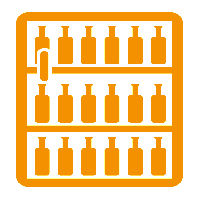 When meeting with potential retailers in a sales meeting, it is important to anticipate what objections what they will have. This way, you can prepare in advance and know how to counter these objections. This is especially important in the beverage industry, where there are so many different brands competing for shelf space and optimal shelf location.
When meeting with potential retailers in a sales meeting, it is important to anticipate what objections what they will have. This way, you can prepare in advance and know how to counter these objections. This is especially important in the beverage industry, where there are so many different brands competing for shelf space and optimal shelf location.
“Your competitors are selling similar beverages for less.”
The biggest objection retailers will have is typically about price. Even if your price is not excessively high, they will say that it is a concern because they want you to drop your price. You can overcome this by visiting the retailer’s stores and looking at the shelf prices of your competitors. Adjust your price according to what you find-you can typically get a good idea of what is good market price for your product by looking at similar products. Make sure that your price is competitive, but leave yourself room for negotiation. In other words, price it low enough that it is similar to your competition’s, but price it high enough that you can drop the price to an acceptable amount if you have to. With a price drop, however, try to compromise by negotiating better shelf space or more opportunities for promotion. Be aware of what your bottom line is- it is necessary to generate profits, so if the retailer is asking for too low of a price, then do not take their offer.
“I’m not sure if your product can sell enough to generate profit.”
This concern goes hand in hand with the previous one. Retailers are out to generate maximum profit, and so to overcome this objection, you have to prove that you can and will earn them profit. Assemble research proving your position in the market, as well as any other market-based research you may have. Demonstrate your successes thus far and speak about your projected earnings. If you can prove that your product will succeed in the market, then they will be convinced that it can generate them profit.
“Can I trust you to ensure I won’t have out-of-stock instances?”
Trust is the basis of any supplier-retailer relationship, so it is important to establish it now during your sales pitch. Consistent stocking relies heavily on the supply chain and logistics of your company, and the reliability and efficiency of your field reps. Assure them that your field reps will be visiting the retailer often to ensure that no product is out of stock.
“We usually don’t sell your type of product.”
Regardless of whether you sell cold-pressed juice or soda, there’s always the possibility that retailers may not be focused on your particular beverage segment. To overcome this objection, demonstrate how your beverage category has grown over the years. If it is a trendy new product, show them how the trend will develop and expand.
“We already have something like this.”
This means you have direct competition who is already one step ahead of you, as they have already secured a spot with your retailer of choice. In order for you to succeed at overcoming this objection, you need to convince the retailer that your beverages are a as good of an option as the competing brand, if not better. As they have already built a relationship with the other brand, it will be difficult to unseat the other brand, so instead show the retailer the benefits of having both brands. For example, you can present research saying that customers prefer to have more variety in a store, so providing two options will result in increased sales for the retailer. If you think that your brand is stronger than the competing brand, then you may present arguments demonstrating that, and the retailer may reconsider and give you priority over the other brand.
In Conclusion
Don’t worry if retailers say they need to speak to their team; it’s not always a bad sign if secondary input is needed. It may just mean that they want to talk it over with their team before fully committing. In this case, you should gauge if they are seriously interested or just trying to provide you with an exit. If you believe that they are interested, you can try and renegotiate, starting with price, if you still have wiggle room there. However, don’t force it- it is better to leave with a good relationship and the possibility of an offer than a bad relationship and no offer at all. Regardless of what you think their interest is, make sure to ask for their feedback and leave them your business card, along with your sales research and any other material that may help convince them to take your offer.
You can now focus your research on certain subjects by keeping these objections in mind. Concrete numbers and examples, as well as future projections, are always more helpful than mere words. Be prepared to negotiate and compromise, but also be prepared to walk away if you think that what they are offering won’t generate you enough revenue. With your research in hand, you are now more ready than ever to successfully pitch your beverages and gain a new retailer.

.png?width=480&height=252&name=PRESS%20RELEASE-2%20(4).png)

